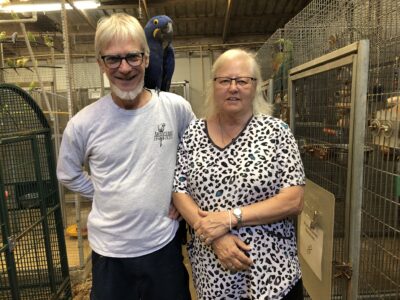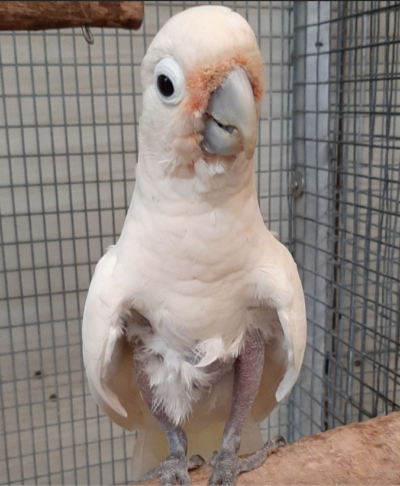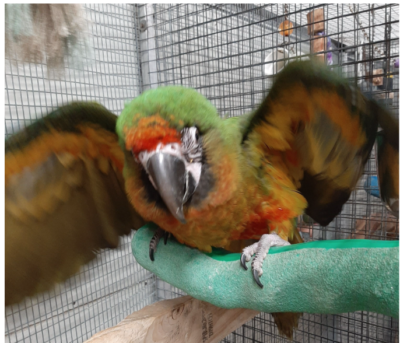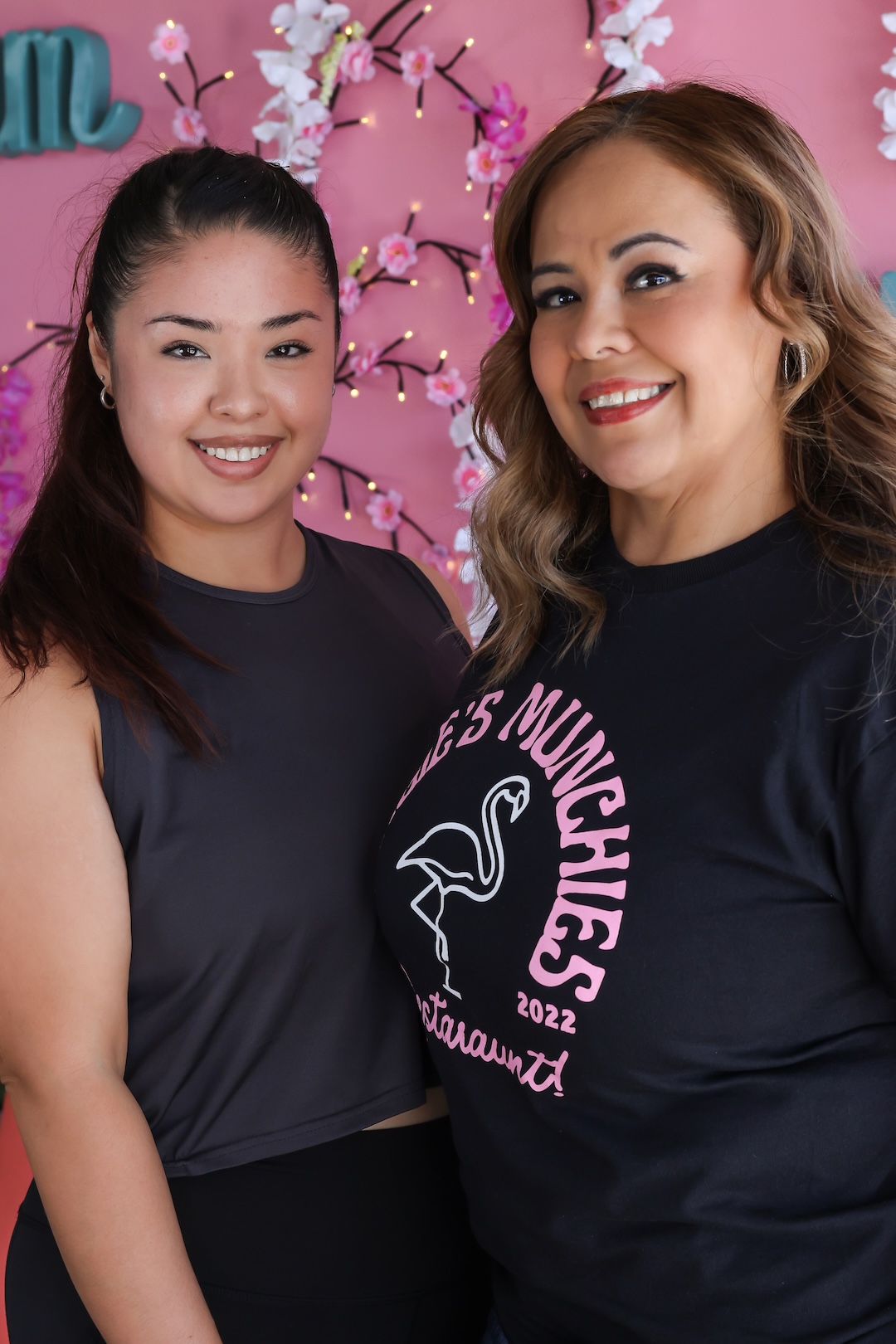
Gary Foster, a macaw, Jean Jordan
Jean Jordan started helping her grandmother raise parakeets as a third grader.
The experience likely provided the stimulus for her return to feathered friends when she opened Adventures in Birds in 1980 in Spring Branch.
At the corner of Westview and Woodvine drives, the store — with cages inside and out — also serves as the home of the nonprofit Spring Branch Animal Sanctuary, which accepts cats and dogs. Jordan and store manager Gary Foster started it in 2010.
The business often has 1,500 birds on hand.
Inside the store, which appears to have little unused space, Foster, who has been store manager for more than 30 years, talked about the long-lived business’ success, which he and Jordan attribute in part to their “stubbornness.”
“This has not been an easy row,” said Jordan.
The cost of food for birds, cats and dogs has gone up, as have other expenses, such as the electric bill, which has reached $900 per month.
“I just appreciate Spring Branch keeping me in business all these years,” Jordan said.
“Very nice Spring Branch people help us keep going,” she explained.
Some birds outlive their owners with their lifespans of more than 30 years. Jordan ends up boarding the birds that owners no longer want.
”We never know from one day to the next what we’re going to be doing. We have a panic situation where suddenly they got to move out of state and they have nobody to take their animals, and they don’t know what they’re going to do. We go pick them (the animals) up and find them homes. We board when people want to go out of town.”
They also can help with minor veterinary matters and grooming.

Goffin’s cocatoo
Dr. Stephen Fronefield of ABC Animal & Bird Clinic comes on his day off and meets animals’ needs at the store. He has been doing so as their veterinarian for more than 30 years, Jordan said.
Birds sell for $15 to more than $5,000, depending on their availability and are grouped as finches, small birds, medium birds and large birds.
The hyacinth macaw, or hyacinthine macaw, is a parrot native to central and eastern South America, for example. In the wild, the species is listed as vulnerable, which is part of the reason they cost more than other types of birds.
Houston’s heat wave this summer reduced bird breeding, Jordan said, but ”hopefully, we’ll make it through like we always do. It’s only by the blessing of the Lord that we’re here.”
Greenwing and hyacinth macaws are among her favorites.
“They have great personalities,” she said. “They talk to you and get attached to you.”
The store also sells pet toys, bedding supplies, perches and nut and seeds from more than 70 bins.
Bird owners can make up their own seed menus, said Jordan, explaining that sometimes birds get picky about food. They eat seeds in winter that they wouldn’t in summer, for example
Customers come from as far away as Lake Charles, La. Brenham, Texas, residents who once lived in the Spring Branch area come back for grooming services or seed that no one else carries, Jordan said.
In a span of less than an hour, Foster and Jordan had visits from a former student who worked in the store, customers who came for seed, a man who was turning in birds to the sanctuary and another man who raises and sells doves to the store.
Store hours are 11 a.m.-3 p.m. Tuesday-Sunday, a reduced schedule that started during the COVID pandemic, said Jordan, and they haven’t been able to replace employees.
She said they’re three to four people shy of what’s needed because they can’t find people who want to do the work — which can be difficult — such as picking up 50 pounds of bird seed, cleaning litter boxes, and cleaning and scrubbing floors. It’s not all about petting birds, who sometimes can be difficult to work with; an employee could go home wearing four or five Band-Aids, added Jordan. So, she and Foster end up taking about one day off for every 14 they work.
Jordan said Foster is totally devoted and helped even further when she was hospitalized. “He’s my savior and best friend. We scream and yell at each other like we are married,” she added.
They are married, but not to each other.

Shamrock macaw
When a prospective bird owner comes in, Jordan said they try to gauge his or her skills and knowledge and budget. They try to find out how much space they have, how much time they have for a bird and whether they live in an apartment or house.
Some birds are too noisy, said Foster. Owning a cockatoo or macaw can get a renter kicked out of his apartment, added Jordan.
The duo also tries to get the customer accustomed to a bird. Jordan explained they have many babies that they hand-feed. A customer can pick out a baby and come in and take care of the bird before he takes it home. The prospective owner will pick out a cage and decide where it will be placed in his home. Cage placement is important.
Jordan listed advantages to having a bird as a pet versus a dog or cat: “You don’t have to walk them; they don’t need shots.”
What they do need is a good diet of seed, fruits and vegetables. They also need time out of their cage.
“Birds are very dependent upon their owners to spend time with them,” she said. “They need somebody that’s going to pay attention to them.” Birds who don’t get the attention they need become neurotic and may pull out feathers, exhibit other odd behaviors and scream and make their owners’ lives miserable.
Most birds need the same regimen of care.
“No. 1, they’re messy,” Jordan said. “They’re going to throw seed on the floor and you’re going to have feathers floating around. And, they’re going to be a little bit noisy. We like to start people off with parakeets or cockatoos. They will talk. They can be super pets.”
Adventures in Birds
7414 Westview
https://www.adventuresinbirdsinc.com/
— by Karen Zurawski





